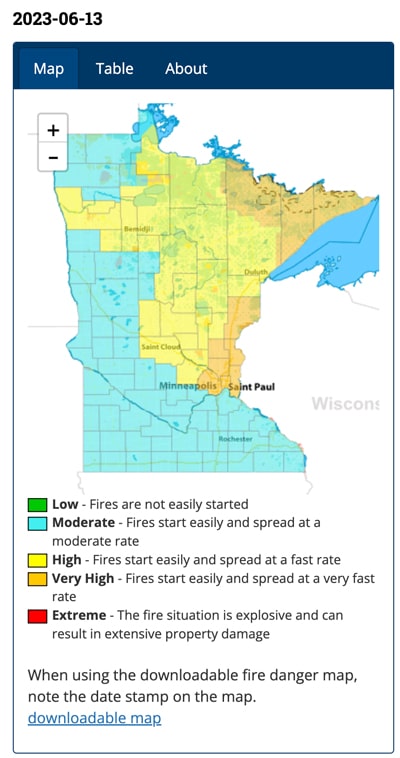
Campfires will not be allowed in the Boundary Waters Canoe Area Wilderness and rustic sites across the Superior National Forest starting at 12:01 a.m. on Wednesday, June 14. The Superior National Forest, the Minnesota Department of Natural Resources, and other agencies announced the bans as drought has begun to grip the region and wildfire risks are high.
Some campfires will still be allowed, but only at more developed recreation sites, such as developed campgrounds, resorts, youth camps, and at private homes.
“Unusually dry conditions have increased the risk of fire. One unintentional spark in these conditions could result in thousands of charred acres and property damage,” Allissa Reynolds, DNR wildfire prevention supervisor, said. “This is a dangerous time for wildfires in northeast Minnesota.”
The prohibition includes not only campfires, but charcoal grills and barbecues, coal, and wood-burning stoves. Propane and other gas stoves are allowed and recommended for cooking outside. The restrictions cover all of northeastern Minnesota.
“We don’t issue burning restrictions lightly. It’s a matter of public safety and resources. Minnesotans have a history of making a difference on wildfire prevention when they keep safety top of mind,” Reynolds said.
The prohibition is focused on remote and backcountry areas because it takes longer for firefighters to respond to fires in such locations, meaning fires there have a higher risk of spreading into major conflagrations.
Current conditions in northeastern Minnesota are considered “Very High,” just one step below the highest level of “Extreme.” Much of the region is three inches behind average rainfall amounts at this time of year. Potential fire fuels are considered very dry and combustible. Hot and dry weather is expected to continue throughout June, keeping fire dangers high, and potentially meaning the fire ban will last for several weeks.
An advisory issued yesterday by the Forest Service office in Milwaukee explained several factors have combined to create the flammable conditions.
“Jack Pine, mixed hardwoods, spruce budworm pockets, peat, and green marsh grass are all burning easily, which is unusual for this time of year,” the National Interagency Fire Center advisory said.
Four out of five wildfires in Minnesota are caused by humans, through debris burning, campfires escaping, vehicles parked on dry material, fireworks, and arson. Violation of the campfire prohibition can result in fines up to $10,000 and up to six months in jail.


